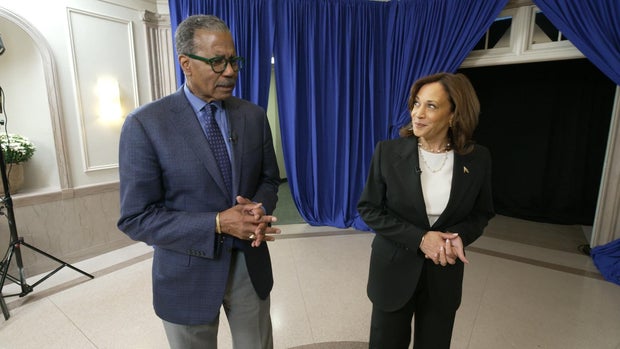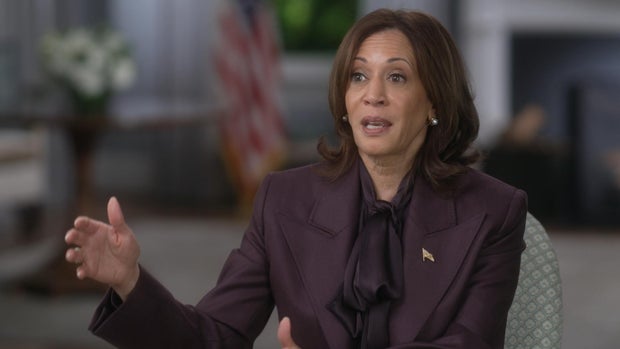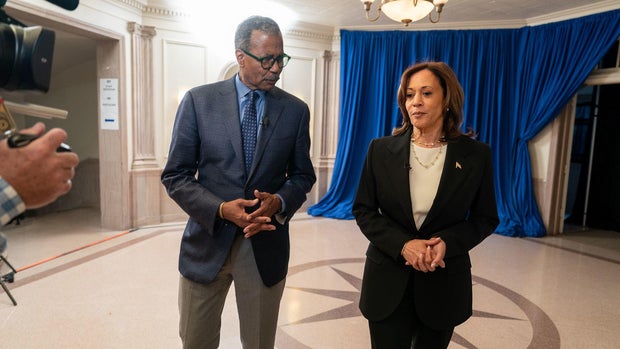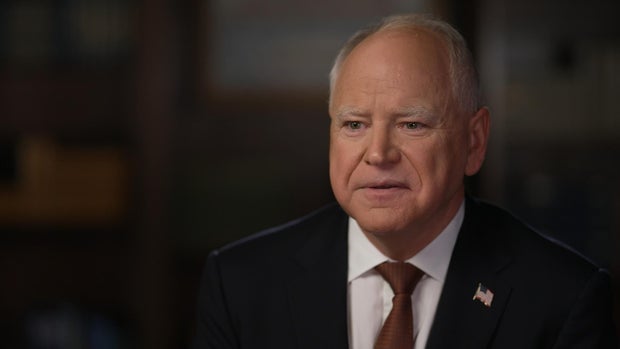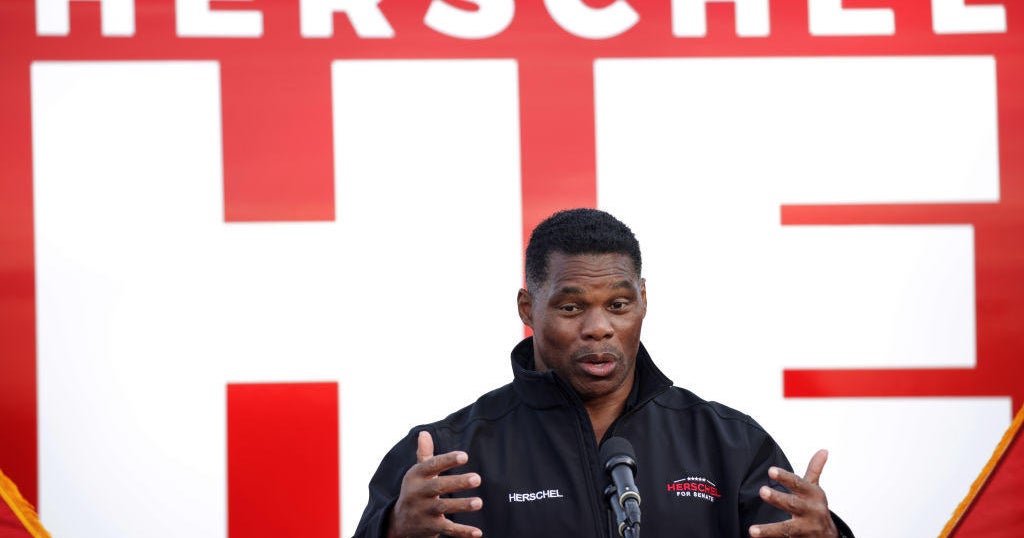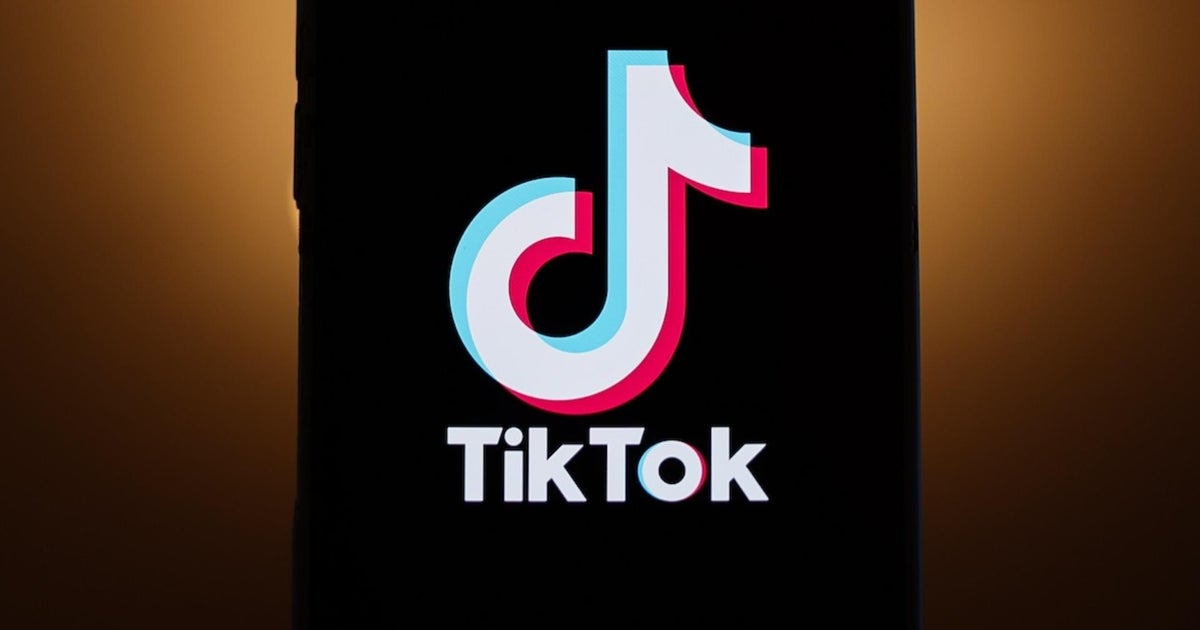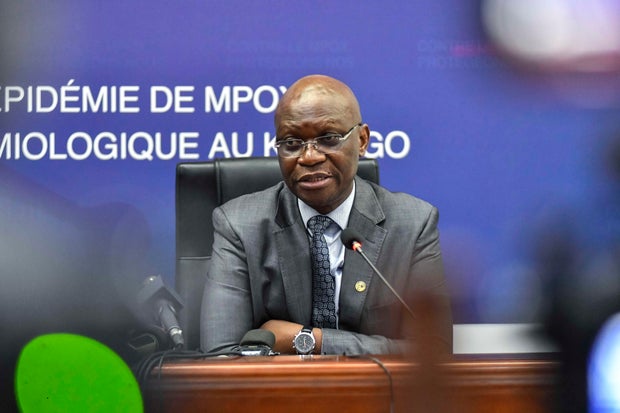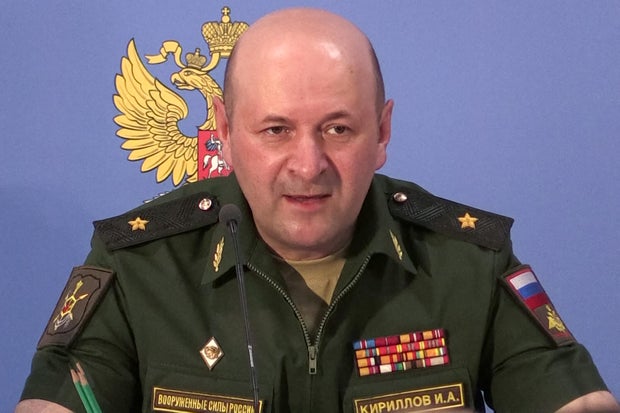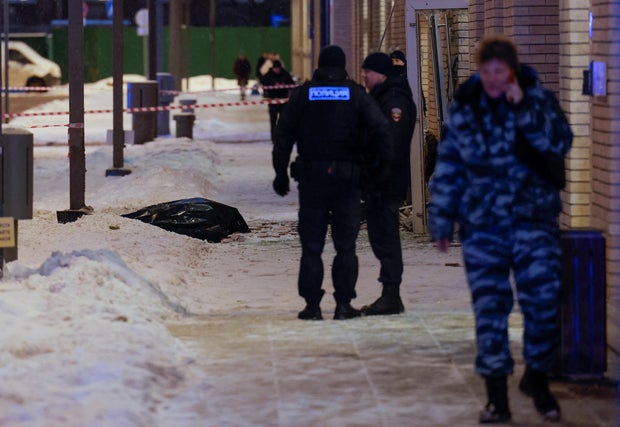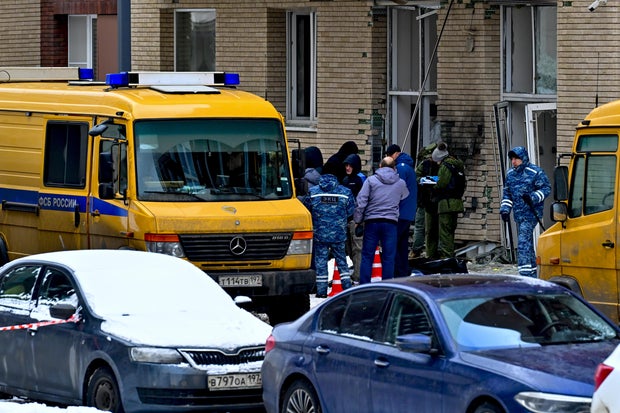CBS News
VP Kamala Harris makes the case for why she should be president | 60 Minutes

Kamala Harris has been a candidate for president for just two-and-a-half months and the post convention “honeymoon” is over. With the election just 29 days away, Harris and her running mate Minnesota Gov. Tim Walz face unrelenting attacks from Donald Trump, and the race remains extremely close.
We met the 59-year-old vice president this past week on the campaign trail and later at the vice president’s residence in Washington, DC. We spoke about the economy and immigration, Ukraine, and China, but we began with the escalating war in the Middle East. one year after the Hamas terror attack on Israel
Bill Whitaker: The events of the past few weeks have pushed us to the brink, if—if not into an all-out regional war in the Middle East. What can the U.S. do at this point to stop this from spinning out of control?
Vice President Kamala Harris: Well, let’s start with October 7. 1,200 people were massacred, 250 hostages were taken, including Americans, women were brutally raped, and as I said then, I maintain Israel has a right to defend itself. We would. And how it does so matters. Far too many innocent Palestinians have been killed. This war has to end.
Bill Whitaker: We supply Israel with billions of dollars in military aid, and yet Prime Minister Netanyahu seems to be charting his own course. The Biden-Harris administration has pressed him to agree to a ceasefire. He’s resisted. You urged him not to go into Lebanon. He went in anyway. Does the U.S. have no sway over Prime Minister Netanyahu?
Vice President Kamala Harris: The work that we do diplomatically with the leadership of Israel is an ongoing pursuit around making clear our principles.
Bill Whitaker: But it seems that Prime Minister Netanyahu is not listening.
Vice President Kamala Harris: We are not gonna stop pursuing what is necessary for the United States to be clear about where we stand on the need for this war to end.
Bill Whitaker: Do we have a–a real close ally in Prime Minister Netanyahu?
Vice President Kamala Harris: I think, with all due respect, the better question is do we have an important alliance between the American people and the Israeli people. And the answer to that question is yes.
While the war in the Middle East has dominated recent headlines, it’s the economy that most concerns American voters this election year, as always.
Bill Whitaker: There are lots of signs that the American economy is doing very well, better than most countries, I think. But the American people don’t seem to be feeling it. Groceries are 25% higher and people are blaming you and Joe Biden for that. Are they wrong?
Vice President Kamala Harris: We now have historic low unemployment in America among all groups of people. We now have an economy that is thriving by all macroeconomic measures. And, to your point, prices are still too high. And I know that, and we need to deal with it, which is why part of my plan—you mentioned groceries. Part of my plan is what we must do to bring down the price of groceries.
60 Minutes
Harris says she’ll press Congress to pass a federal ban on price gouging for food and groceries, but details are yet to be defined.
Bill Whitaker: You want to expand– the child tax credit.
Vice President Kamala Harris: Yes, I do.
Bill Whitaker: You want to give tax breaks to first-time home buyers.
Vice President Kamala Harris: Yes.
Bill Whitaker: And people starting small businesses.
Vice President Kamala Harris: Correct.
Bill Whitaker: But it is estimated by the Nonpartisan Committee for Responsible Federal Budget that your economic plan would add $3 trillion to the federal deficit over the next decade. How are you gonna pay for that?
Vice President Kamala Harris: OK, so the other econ- economists that have reviewed my plan versus my opponent and determined that my economic plan would strengthen America’s economy. His would weaken it.
Bill Whitaker: But–
Vice President Kamala Harris: My plan, Bill, if you don’t mind, my plan is about saying that when you invest in small businesses, you invest in the middle class, and you strengthen America’s economy. Small businesses are part of the backbone of America’s economy.
Bill Whitaker: But—but pardon me, Madame Vice President, I– the– the question was, how are you going to pay for it?
Vice President Kamala Harris: Well, one of the things is I’m gonna make sure that the richest among us, who can afford it, pay their fair share in taxes. It is not right that teachers and nurses and firefighters are paying a har– a higher tax rate than billionaires and the biggest corporations.
Bill Whitaker: But—but
Vice President Kamala Harris: And I plan on making that fair.
Bill Whitaker: But we’re dealing with the real world here.
Vice President Kamala Harris: But the real world includes—
Bill Whitaker: How are you gonna get this through Congress?
60 Minutes
Vice President Kamala Harris: You know, when you talk quietly with a lot of folks in Congress, they know exactly what I’m talking about, ’cause their constituents know exactly what I’m talking about. Their constituents are those firefighters and teachers and nurses. Their constituents are middle-class, hard-working folk.
Bill Whitaker: And Congress has shown no inclination to move in your direction.
Vice President Kamala Harris: I– I disagree with you. There are plenty of leaders in Congress who understand and know that the Trump tax cuts blew up our federal deficit. None of us, and certainly I cannot afford to be myopic in terms of how I think about strengthening America’s economy. Lemme tell you something. I am a devout public servant. You know that. I am also a capitalist. And I know the limitations of government.
Kamala Harris has been in government for decades; she was first elected San Francisco district attorney in 2003, then California attorney general, she went on to the U.S. Senate, and now vice president.
Bill Whitaker: A quarter of registered voters still say they don’t know you. They don’t know what makes you tick. And– and why do you think that is? What–what’s the disconnect?
Vice President Kamala Harris: It’s an election, Bill. And I take– it seriously that I have to earn everyone’s vote. This is an election for president of the United States. No one should be able to take for granted that they can just declare themselves a candidate and automatically receive support. You have to earn it. And that’s what I intend to do.
Bill Whitaker: Lemme tell you what your critics and the columnists say.
Vice President Kamala Harris: OK.
Bill Whitaker: They say that the reason so many voters don’t know you is that you have changed your position on so many things. You were against fracking, now you’re for it. You supported looser immigration policies, now you’re tightening them up. You were for Medicare for all, now you’re not. So many that people don’t truly know what you believe or what you stand for. And I know you’ve heard that.
Vice President Kamala Harris: In the last four years I have been vice president of the United States. And I have been traveling our country. And I have been listening to folks and seeking what is possible in terms of common ground. I believe in building consensus. We are a diverse people. Geographically, regionally, in terms of where we are in our backgrounds. And what the American people do want is that we have leaders who can build consensus. Where we can figure out compromise and understand it’s not a bad thing, as long as you don’t compromise your values, to find common-sense solutions. And that has been my approach.
But one issue that has proven impervious to compromise is immigration. Over the past four years, the Biden/Harris approach has been inconsistent, and Republicans are convinced immigration is the vice president’s achilles heel.
Bill Whitaker: You recently visited the southern border and– embraced President Biden’s recent crackdown on asylum seekers. And that crackdown produced an almost immediate and dramatic decrease in the number of border crossings. If that’s the right answer now, why didn’t your administration take those steps in 2021?
Vice President Kamala Harris: The first bill we proposed to Congress was to fix our broken immigration system, knowing that if you want to actually fix it, we need Congress to act. It was not taken up. Fast forward to a moment when a bipartisan group of members of the United States Senate, including one of the most conservative members of the United States Senate, got together, came up with the border security bill. Well, guess what happened? Donald Trump got word that this bill was afoot and could be passed and he wants to run on a problem instead of fixing a problem, so he told his buddies in Congress, “Kill the bill. Don’t let it move forward.”
Bill Whitaker: But I’ve been covering the border for– for years. And so I know this is not a problem that started with your administration.
Vice President Kamala Harris: Correct. Correct.
Bill Whitaker: But there was an historic flood of undocumented immigrants coming across the border the first three years of your administration. As a matter of fact, arrivals quadrupled from the last year of President Trump. Was it a mistake to loosen the immigration policies as much as you did?
Vice President Kamala Harris: It’s a longstanding problem. And solutions are at hand. And from day one, literally, we have been offering solutions.
60 Minutes
Bill Whitaker: What I was asking was, was it a mistake to kind of allow that flood to happen in the first place?
Vice President Kamala Harris: I think– the policies that we have been proposing are about fixing a problem, not promoting a problem, okay? But the–
Bill Whitaker: But the numbers did quadruple under your–
Vice President Kamala Harris: And the numbers today–
Bill Whitaker: –under your watch–
Vice President Kamala Harris: –because of what we have done– we have cut the flow of illegal immigration by half. We have cut the–
Bill Whitaker: But should you have done that–
Vice President Kamala Harris: –flow of fentanyl–
Bill Whitaker: –should you have done that–
Vice President Kamala Harris: –by half. But we need Congress to be able to act to actually fix the problem.
Bill Whitaker: You have accused Donald Trump of using racist tropes when it comes to Haitian immigrants in Springfield, Ohio, when it comes to birtherism, when it comes to Charlottesville. In fact, you have called him a racist and divisive. Yet Donald Trump has the support of millions and millions of Americans. How do you explain that?
Vice President Kamala Harris: I am glad you’re pointing these comments out that he has made, that have resulted in a response by most reasonable people to say, “It’s just wrong. It’s just wrong.”
Bill Whitaker: With so many people supporting Donald Trump, a man you have called a racist. How do you bridge that seemingly unbridgeable gap?
Vice President Kamala Harris: I believe that the people of America want a leader who’s not tryin’ to divide us and demean. I believe that the American people recognize that the true measure of the strength of a leader is not based on who you beat down, it’s based on who you lift up.
The Harris campaign has been hopscotching the country and with less than a month to go, the pace is picking up. The vice president told us, she’s lost track of how many states she’s visited.
Vice President Kamala Harris: How are you doing?
Bill Whitaker: I’m doing well.
Vice President Kamala Harris: You well?
We joined her on the trail late last week, in the crucial swing state of Wisconsin, in the town of Ripon, the birthplace in 1854 of the Republican Party.
And at a rally plastered with “country over party” banners, Harris appeared with staunch conservative Liz Cheney. As vice chair of the House January 6th Committee, Cheney became one of Donald Trump’s fiercest critics.
Liz Cheney: I have never voted for a Democrat, but this year, I am proudly casting my vote for Vice President Kamala Harris (applause)
That proclamation spurred a chant of approval from the crowd…
Bill Whitaker: Four years ago if someone had told you that you would be campaigning with Liz Cheney, what would you have said to them?
Vice President Kamala Harris: That’d be great. (laughter)
Liz Cheney: She’s really diplomatic. (laughter)
Bill Whitaker: Would you ever have thought that you’d be campaigning with Kamala Harris?
Liz Cheney: I hope that if you had said to me four years ago, “Our constitution is going to be under threat and it’s gonna be crucial for the parties to come together– and to support Vice President Harris because she’ll defend the rule of law”– I know I would’ve said, “That’s exactly what I’ll do.”
Whoever wins the presidency will take on a host of daunting challenges, especially beyond our borders. Back in Washington, Vice President Harris told us she’s determined the U.S must win the economic competition with China for the 21st century. And as for the war between Russia and Ukraine?
Bill Whitaker: What does success look like in ending the war in Ukraine?
Vice President Kamala Harris: There will be no success in ending that war without Ukraine and the UN charter participating in what that success looks like.
Bill Whitaker: Would you meet with President Vladimir Putin to negotiate a solution to the war in Ukraine?
Vice President Kamala Harris: Not bilaterally without Ukraine, no. Ukraine must have a say in the future of Ukraine.
Bill Whitaker: As president, would you support the effort to expand NATO to include Ukraine?
Vice President Kamala Harris: Those are all issues that we will deal with if and when it arrives at that point. Right now, we are supporting Ukraine’s ability to defend itself against Russia’s unprovoked aggression. Donald Trump, if he were president, Putin would be sitting in Kyiv right now. He talks about, “Oh, he can end it on day one.” You know what that is? It’s about surrender.
Bill Whitaker: A hard left turn here. But– you recently surprised people when you said that you are a gun owner and that if someone came into your house–
Vice President Kamala Harris: That was not the first time I’ve– I’ve–
Bill Whitaker: –they would get shot.
Vice President Kamala Harris: –talked about it. That’s not the first time I’ve talked about it.
Bill Whitaker: So what kind of gun do you own, and when and why did you get it?
Vice President Kamala Harris: I have a Glock, and– I’ve had it for quite some time. And– I mean, look, Bill, my background is in law enforcement. And– so there you go.
Bill Whitaker: Have you– ever fired it?
Vice President Kamala Harris: Yes. (laugh) Of course I have. At a shooting range. Yes, of course I have.
Democratic vice-presidential candidate Tim Walz was little-known outside Minnesota just two months ago. He didn’t exactly come from nowhere. He was a six-term congressman and now is governor of Minnesota, where he has championed abortion rights, gun control, and other progressive ideas. But it was calling former President Trump and Sen. JD Vance “weird” that may have landed him on the ticket.
60 Minutes
Bill Whitaker: Two months ago, you and Kamala Harris barely knew each other. Now, you’re running together, vying for the top offices in the land. It’s not possible that you agree on everything.
Gov. Tim Walz: Yeah.
Bill Whitaker: What have been some disagreements you’ve had since you became a team?
Gov. Tim Walz: Well—I—she’d probably disagreed with—she said, “Tim, you know, you need to be a little more careful on how you say (laugh) things,” whatever it might be.
Whatever it might be, Walz has been criticized for embellishing or telling outright falsehoods about his military record, and about his travels to Asia in the 1980s.
Bill Whitaker: In your debate with JD Vance, you said, “I’m a knucklehead (laugh) at times.” And I think you were referring to the time that you said that you were in Hong Kong during the Tiananmen Square unrest when you were not.
Gov. Tim Walz: Yeah.
Bill Whitaker: Is that kind of misrepresentation, isn’t that more than just being a knucklehead?
Gov. Tim Walz: I think folks know who I am. And I think they know the difference between someone expressing emotion, telling a story, getting a date wrong by–you–rather than a pathological liar like Donald Trump.
Bill Whitaker: But I think it comes down to the question of whether—whether you can be trusted to tell the truth.
Gov. Tim Walz: Yeah. Well– I can– I think I can. I will own up to being a knucklehead at times, but the folks closest to me know that I keep my word.
Walz proudly touts his record as governor of Minnesota, but it also has opened him up to criticism from his Republican opponents.
Bill Whitaker: Former President Trump says that you and your administration here in Minnesota has been dangerously liberal. Radical left, he calls it. So, what do you say to that criticism, that rather than leading the way, you and Minnesota are actually out of step with the rest of the country?
Gov. Tim Walz: President Trump may be referring to that – that our children get breakfast and lunch in school so that they can learn. He may be talkin’ about we have a paid family medical leave policy that was promoted by the business community. Donald Trump spends his time tearing down states rather than lifting up the things we do, the best of it. Donald Trump’s critiques of that, not only are they wrong, but I’m waiting for, “What—what is his solution? Here in Minnesota, we’re so optimistic, we walk on water half the year (laugh).
It was that kind of humor and candor that helped land Tim Walz the job as Kamala Harris’s running mate.
Bill Whitaker: Before you joined the– ticket, you called Republicans “weird.” And that’s sort of become a rallying cry for Democrats. Why do you think that label stuck?
Gov. Tim Walz: I was really talking about the behaviors. Being obsessed with people’s personal lives in their bedrooms and their reproductive rights, making up stories about legal –folks legally here eating cats and dogs, they’re dehumanizing. They go beyond weird because I said this: it becomes almost dangerous. Let’s debate policy in a real way and let’s try and find an objective truth again.
Kamala Harris and Tim Walz are in a full sprint to November 5th, hoping their arguments will give them a chance to cross the line ahead of Donald Trump and JD Vance.
Bill Whitaker: You are sitting here with us. The Trump campaign canceled an interview that they had agreed to, to participate in this broadcast. What do you make of that?
Vice President Kamala Harris: If he is not gonna give your viewers the ability to have a meaningful, thoughtful conversation, question and answer with you, then watch his rallies. You’re gonna hear conversations that are about himself and all of his personal grievances. And what you will not hear is anything about you, the listener. You will not hear about how he is gonna try to bring the country together, find common ground. And, Bill, that is why I believe in my soul and heart, the American people are ready to turn the page.
Produced by Marc Lieberman and Rome Hartman. Associate producers: Cassidy McDonald, Matthew Riley and LaCrai Scott. Broadcast associates: Mariah Johnson and Georgia Rosenberg. Edited by Warren Lustig and Craig Crawford.
CBS News
2 sisters, 7 years apart in age, also receive heart transplants 7 years apart in Chicago
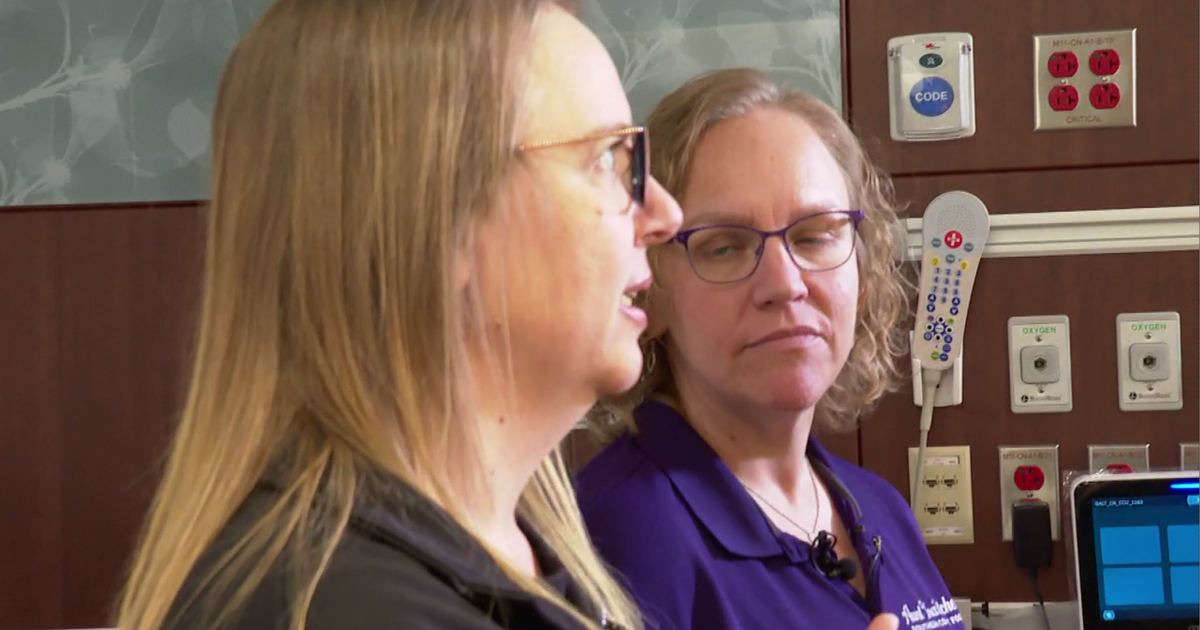
CHICAGO (CBS) — Two sisters have grateful hearts after they both received heart transplants at the same age—seven years apart.
Younger sister Meredith Everhart and older sister Abbey Cannon are now bonded by a genetic condition and a second chance at life.
“What’s ironic is that when she needed a heart transplant, was exactly the same age I needed a heart transplant,” said Cannon. “Seven years apart in age, seven years apart within 30 days of transplant, and our birthdays are within 30 days.”
The sisters share a special bond of getting a second chance at life, which they both received at the age of 38 years old.
Both sisters suffer from hypertrophic cardiomyopathy—otherwise known as HCM.
The genetic condition is a form of heart disease that causes the heart muscle to thicken.
In 2012, Cannon had chest pain. She was misdiagnosed in Nashville, Tennessee, and got a second opinion at Northwestern Medicine in 2016.
“Within six months, I was inpatient on an aortic balloon pump waiting for a heart,” Cannon said. “I ended up getting my heart 32 days later, So my date is February 27, 2017.”
Just months after Cannon’s transplant, Everhart was diagnosed with HCM too. She tried medication and participated in clinical trials, but her condition kept getting worse.”
“For me, it was, she’s right—I was in denial for a long time,” said Everhart, “and I didn’t want to be sick. I was in my 20s. I was in my early 30’s. I was like, this is not happening. I saw how bad she suffered.”
In May 2022, Everhart got COVID-19, and it sent her into heart failure.
She was added to the transplant list one year later.
“I got the call on January 29 of this year, 2024, and it’s been a journey,” Everhart said. “It’s been fantastic though. Northwestern has been great.”
Cannon said she can’t stress enough how important it is to become an organ donor.
“Had we not had someone that gave that most selfless gift, neither of us would be here,” she said.
CBS News
Congo says mystery disease behind dozens of deaths of women and children finally identified as severe malaria

Johannesburg — For weeks it was dubbed simply “Disease X.” But the mysterious flu-like disease that has killed more than 143 people — mainly women and young children — in the Democratic Republic of Congo has finally been identified.
“The mystery has finally been solved,” Congo’s health ministry declared in a statement on Tuesday. “It’s a case of severe malaria in the form of a respiratory illness.”
The health agency said malnutrition in the hardest-hit region had weakened the local population’s immunity, leaving them more vulnerable to the disease. People who contracted the malaria infection have exhibited symptoms including headache, fever, cough and body ache.
The Congo’s health minister had told journalists the country was on “maximum alert” over the spread of the previously unidentified disease, and health officials told CBS News in early December that the remoteness of the epicenter of the outbreak and lack of a diagnosis made it difficult to launch a concerted response.
Samy Ntumba Shambuyi/AP
At least 592 cases were reported after the alert was first raised by Congo’s health ministry on Oct. 29. The ministry said the disease had a fatality rate of 6.25%. More than half of the deaths recorded were children younger than five who were severely malnourished when they contracted the disease, according to the World Health Organization.
At a press briefing on Dec. 10, WHO Director-General Tedros Adhanom Ghebreyesus said 10 out of 12 samples from patients suffering from the mysterious disease had tested positive for malaria, but he said they were still testing at the time for other diseases.
The Congolese government had sent a rapid intervention team to the Kwango province, 435 miles southeast of capital city Kinshasa, consisting of epidemiologists and other medical experts. Their objective was to identify the disease and mount a suitable response. Government officials had earlier warned locals to avoid touching people infected with the illness or the bodies of those who had died.
Congo has suffered from many disease outbreaks in recent years, including typhoid, malaria and anemia. The country has also grappled with an mpox outbreak, with more than 47,000 suspected cases and over 1,000 suspected deaths from the disease, according to the WHO.
Anti-malaria medicine provided by the WHO was being distributed at local health centers in Congo, and WHO officials said more medical supplies were due to arrive in the country Wednesday.
It’s the rainy season in Congo, which often sees a rise in malaria cases, and will certainly complicate treating those most at risk.
CBS News
Russia says suspect detained in killing of Gen. Igor Kirillov, head of Russian chemical weapons unit

Moscow — Russia’s security service said Wednesday that it had detained a suspect in the killing of a senior general in a Moscow bomb blast. The suspect was described as an Uzbek citizen whom the agency said had been recruited by Ukrainian intelligence services.
Ukrainian security sources told CBS News on Monday that the Security Service of Ukraine (SBU) was behind the explosion that killed Lt. General Igor Kirillov. The claim couldn’t be independently verified, but Russian officials quickly vowed to take revenge against Ukraine’s leaders.
Russia’s Federal Security Service didn’t name the suspect, but it said he was born in 1995. According to an FSB statement, the suspect said he was recruited by Ukrainian special services.
AFPTV / AFP via Getty Images
“Kirillov was a war criminal and an absolutely legitimate target, since he gave orders to use prohibited chemical weapons against the Ukrainian military,” an informed source in the SBU asserted to CBS News. “Such an inglorious end awaits everyone who kills Ukrainians. Retribution for war crimes is inevitable.”
Kirillov was killed by a bomb hidden in an electric scooter outside his apartment building in Moscow, a day after Ukraine’s security service leveled criminal charges against him. His assistant also died in the attack.
The FSB said the suspect had been promised a reward of $100,000 and permission to move to a European Union country in exchange for killing Kirillov. It said that, acting on instructions from Ukraine, the suspect traveled to Moscow, where he picked up a homemade explosive device. He then placed the device on an electric scooter and parked it at the entrance of the residential building where Kirillov lived.
The suspect then rented a car to monitor the location and set up a camera that livestreamed video from the scene to his handlers in the central Ukrainian city of Dnipro. When Kirillov was seen leaving the building, the suspect detonated the bomb.
According to the FSB’s statement, the suspect faces “a sentence of up to life imprisonment.”
Kirillov, 54, was the chief of the Russian military’s radiological, biological and chemical protection forces. Either Kirillov himself or his military unit were sanctioned by several countries, including the U.S., Britain and Canada, for the alleged use of chemical weapons on the battlefield in Ukraine. On Monday, Ukraine’s SBU had opened a criminal investigation against him, accusing him of directing the use of banned chemical weapons.
Maxim Shemetov/REUTERS
Ukraine’s SBU has said it recorded more than 4,800 occasions when Russia used chemical weapons on the battlefield since President Vladimir Putin launched his full-scale invasion in February 2022. In May, the U.S. State Department announced sanctions against Kirillov’s unit, saying the U.S. had recorded the use of chloropicrin, a poison gas first deployed in World War I, against Ukrainian troops.
Russia has denied using any chemical weapons in Ukraine and, in turn, has accused Kyiv of using toxic agents in combat, and Kirillov was allegedly behind the spread of that propaganda.
Kirillov, who had been in his post since April 2017, was accused by the U.S. government of helping to spread disinformation about biological weapons and research.
In March 2023, about a year into Russia’s full-scale invasion, the U.S. State Department said Kirillov had “significantly increased his media engagement” to issue repeated, baseless claims that the U.S. government had been involved in creating both the mpox virus and COVID-19, and that the U.S. “is developing biological weapons able to selectively target ethnic groups.”
“The U.S. Government is concerned that this false narrative may be a prelude for a false-flag operation, where Russia itself uses biological, chemical, or nuclear weapons in Ukraine, and then attempts to blame it on Ukraine and/or the United States,” the State Department said at the time.
Sefa Karacan / Anadolu via Getty Images
The bomb used in Tuesday’s attack was triggered remotely, according to Russian news reports. Images from the scene showed shattered windows and scorched brickwork.
Russia’s top state investigative agency said it’s looking into Kirillov’s death as a case of terrorism, and officials in Moscow vowed to punish Ukraine.


